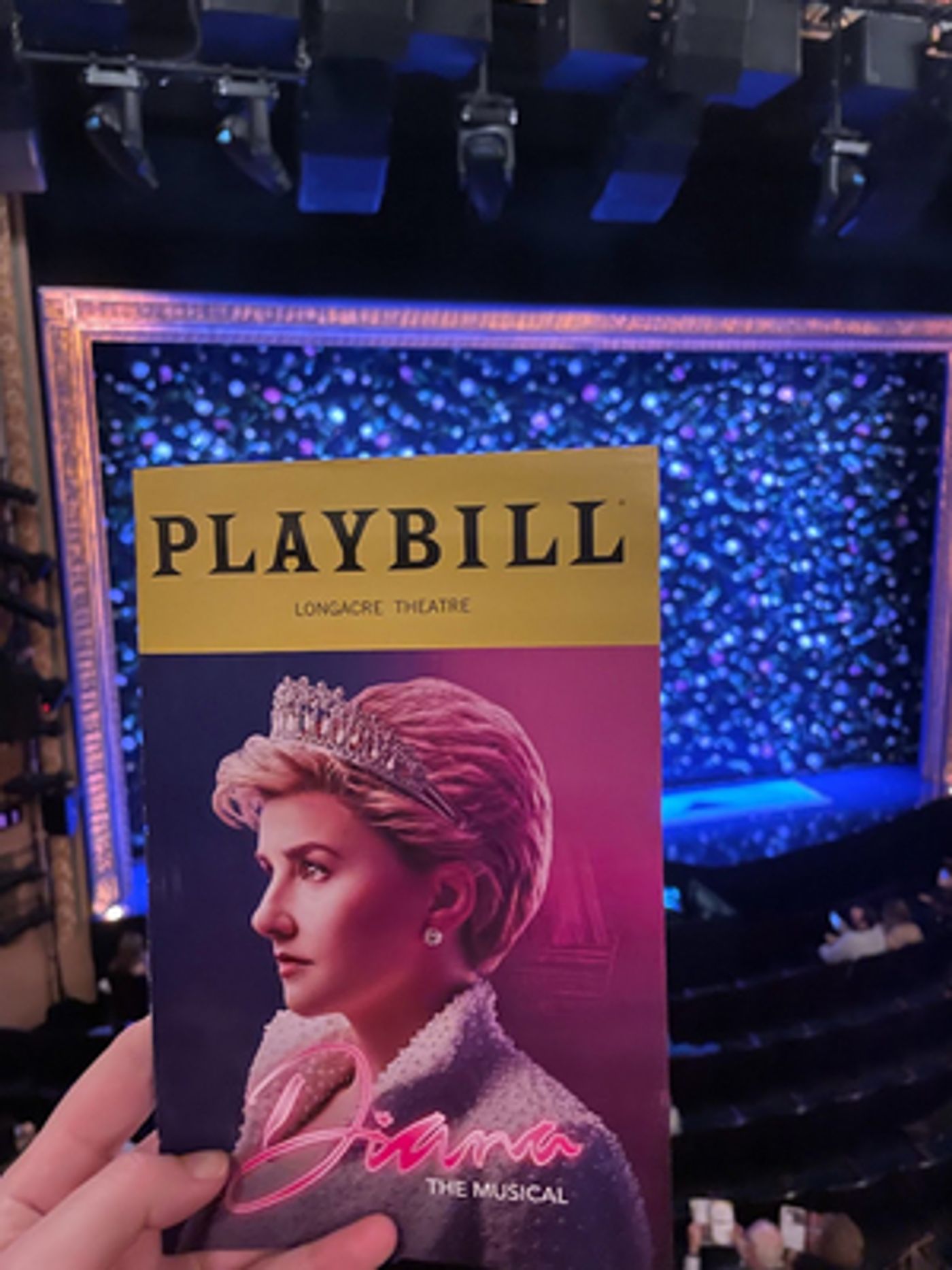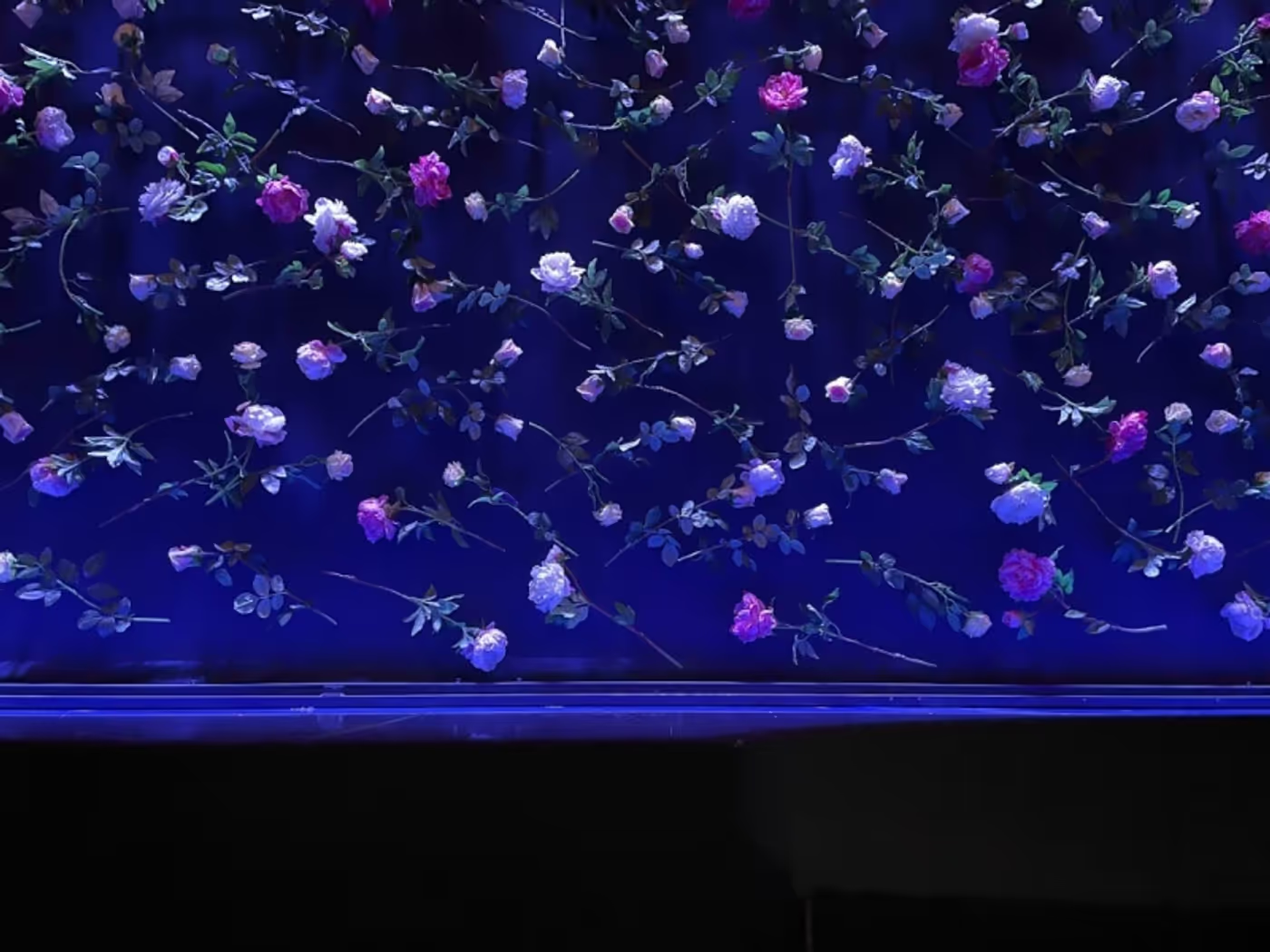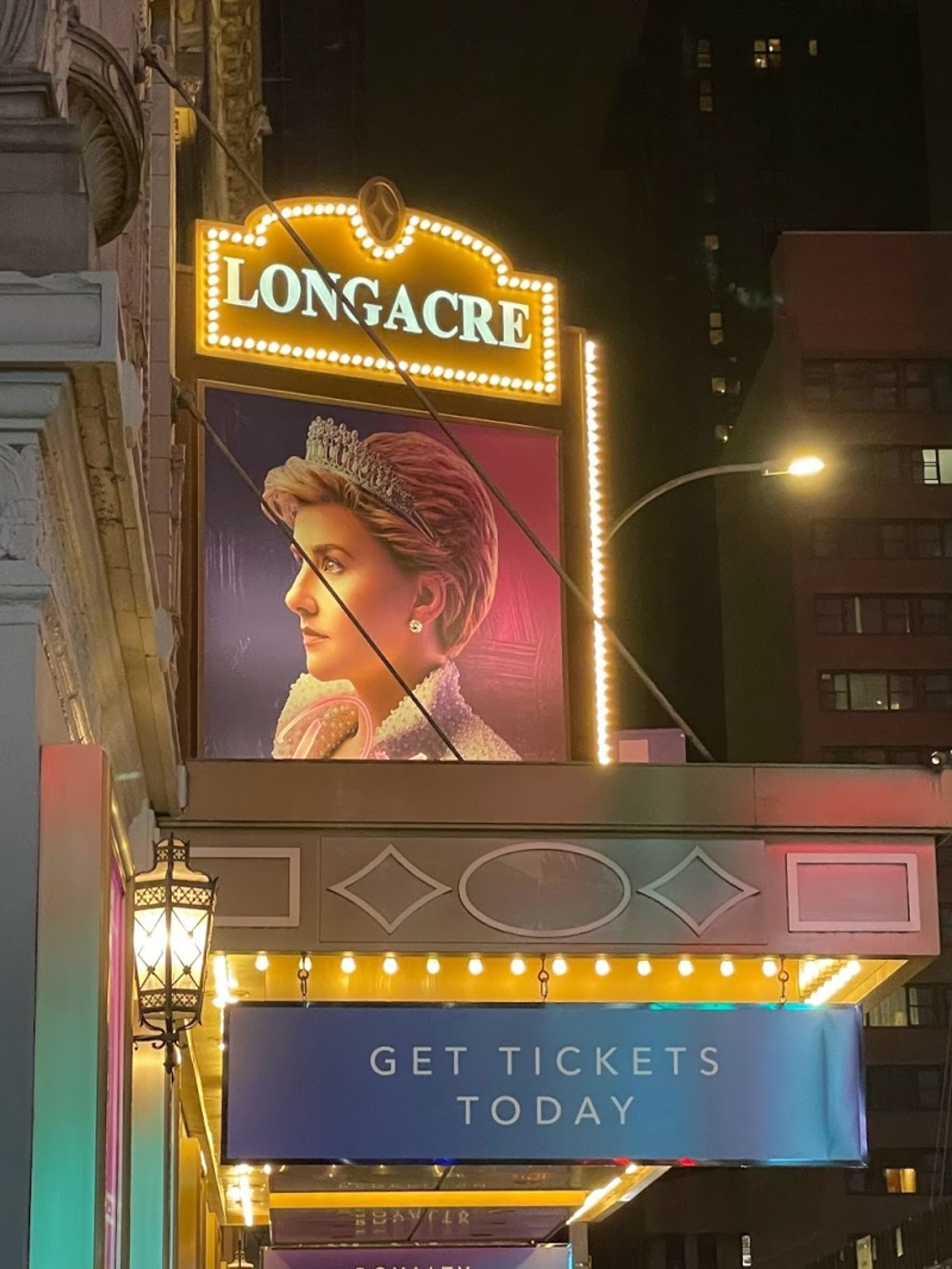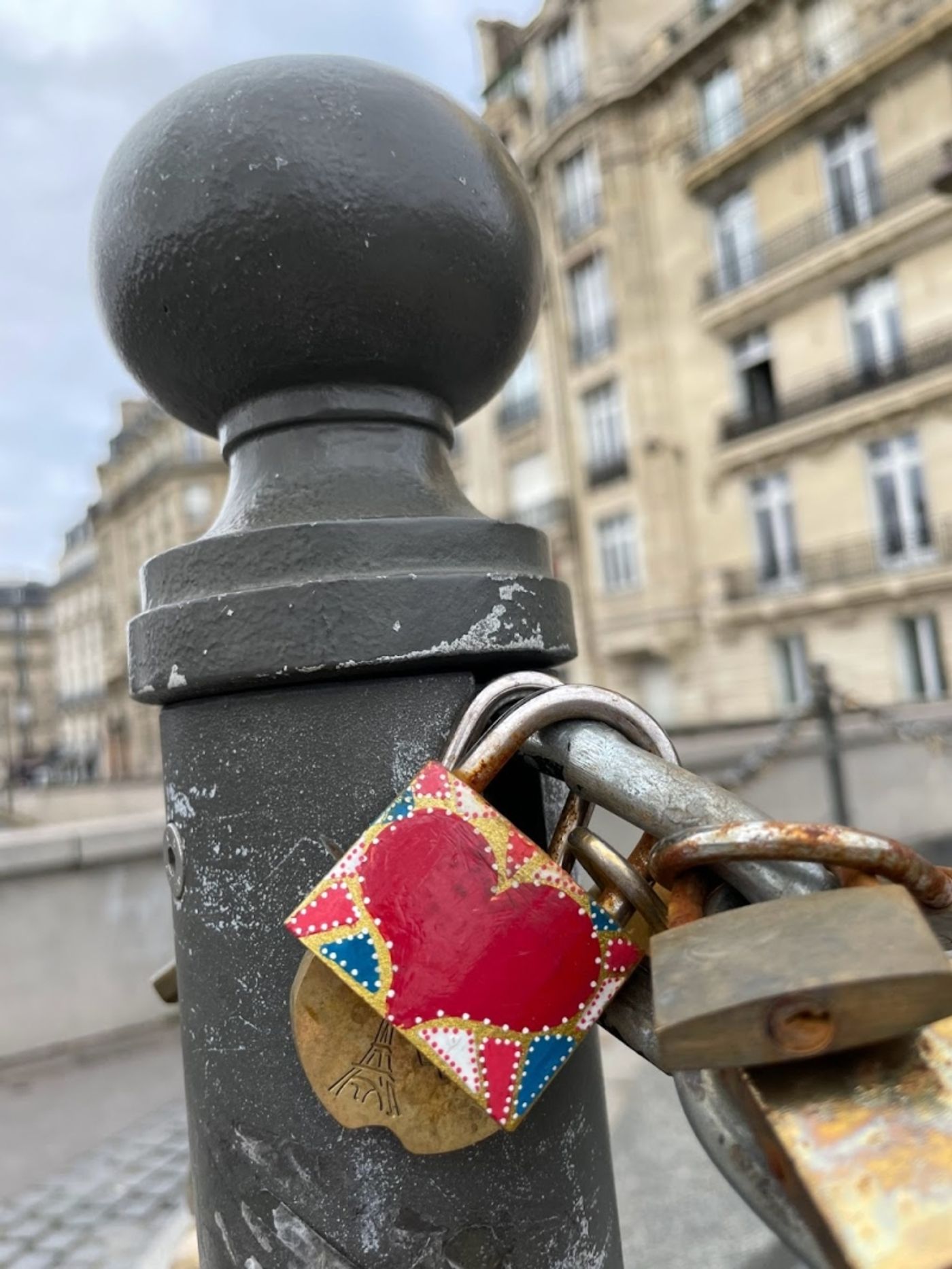Student Blog: Was There Ever A Greater Tabloid Tale?
The Story of Diana the Musical

"Snap, Click" - An Introduction to Diana the Musical
Diana has been on my mind for many years. In fact, I actually wrote about it in quite a few of my earlier articles, constantly stating that it would be the first show that I wanted to see once Broadway reopened. In one of those articles, I wrote, "If you've read any of my blog posts in the Student Center, then you probably already know how excited I am for Diana. Princess Diana was an incredible woman and she has been one of my inspirations for years. The musical seems like it's going to be a nice tribute and will tell Diana's story in a way that many will approve of." If only I knew just how much of an impact this show would have on my life.
All I had known about Diana, in the beginning, was that it was directed by Christopher Ashley and choreographed by Kelly Devine, two creatives who had worked on one of my favorite musicals of all time, Come From Away. My hope for the success of this new show about the "People's Princess" grew, as I had complete faith in anyone involved in Come From Away. Along with my faith in Ashley and Devine, I had a deep admiration for Princess Diana. Even though Princess Diana was only 37 when she passed away, she remains one of the most influential modern figures in the world. When asked about Diana's impact on their lives, many, including cast member Nathan Lucrezio, mentioned that her death was something that they would "never forget." André Jordan, another cast member, mentioned that "Diana was just someone that my entire family talked about and loved." Bruce Dow, a member of the cast until the beginning of its Broadway run, had come out as queer during the 1980s as the AIDS crisis began, and referenced the photo of Princess Diana shaking hands with an AIDS patient as a powerful moment during a time of terror and death. For him and many others, "Diana's actions made a big impact."
To be honest, I was surprised that a Diana show had not been on Broadway sooner. There had been that one musical about Diana on YouTube, but other than that, nothing. But, over two decades after Diana's death, a show emerged and would make its way to the Longacre Theatre on Broadway - Diana: The Musical. Unfortunately, it would not last long, not even making it to 2022. What made this show so special after less than fifty performances on Broadway? Why are people still talking about it? Diana, like the woman whose life it focuses on, faced controversies and undeserved ridicule, leading to an untimely end.
"I Will" - The Creation of Diana the Musical
As part of my research for this article, I had the opportunity to speak with Joe DiPietro, the man who created Diana. DiPietro was fascinated by the life of Princess Diana, a "very young woman caught up in a circus of royalty and media" who still had a "great sense of charity and empathy for other people." In order to write the musical, DiPietro read several biographies of not only Diana but of other people involved in her life and watched documentaries. The original version of Diana was seen as a "black comedy" that commented on the anti-American concept of being born into royalty, but after it was presented at New York Stage & Film, a festival at Vassar College, DiPietro realized that people found the story of Diana more compelling than funny. He decided to make the main focus of the story the love triangle between Diana, Prince Charles, and Camilla Parker Bowles. The show continued to change through workshops and the cast and crew were given the opportunity to help shape their characters, influencing Diana as a whole.
Several cast and crew members had spoken with people who interacted with Princess Diana during her life, including Andrew Morton and Paul Burrell, two men who would become characters in the musical. Lucrezio, who played Andrew Morton in Diana, met Morton during the show's run at the La Jolla Playhouse and kept in touch with him online after that meeting. Burrell was also friendly with cast members, reaching out to them on social media and discussing the show. Others actors, like Roe Hartrampf, chose to not reach out to any of those involved in Princess Diana's life, keeping the separation between real-life people and characters. Bruce Dow even stopped using Paul Burrell's northern accent, acknowledging that his performance "would not be a realistic portrayal of him." But even actors who spoke to people connected to their characters acknowledged and respected the fine line between real life and fantasy. As Lucrezio stated, "My performance is not a reenactment in any shape. I am very different from Andrew and I did not attempt to do a mimicry of who he is as a person. Musical Theater is heightened reality, and I had the opportunity to represent the truth of a situation and a real-life person but create a character that was its own."
"The Main Event" - Diana at La Jolla
In order to understand how the show had changed over the years, I was given a chance to read the script of Diana from the La Jolla Playhouse production. Even at La Jolla, the show was already going through major changes. The creators decided to focus more on the relationship between Charles and Diana, going deeper into their characters and how they developed over the years. One of the most dramatic changes from La Jolla to Broadway was the beginning of Diana. The show began with the song "Once Upon A Time," titled quite appropriately for "The People's Princess." The song gave introductions to Diana, Charles, and Camilla, immediately thrusting the audience into the infamous love triangle. We are then shown Diana and Charles speaking at a polo match, the first time they have talked since Charles dated Diana's older sister, Sarah. The scene is a beautiful mix of melancholy and hope, giving the audience a look into the personalities of both Diana and Charles.
There were several scenes with a younger version of Diana appeared on stage, along with her father, John Spencer. All scenes with young Diana were cut and the character of John Spencer was as well, with some of his scenes with Diana being replaced with Diana's sister, Sarah. Even though some songs were cut, many from the La Jolla run made their way into the Broadway production with only some lyric changes. For example, in "Whatever Love Means Anyway," one of the lyrics that was changed after La Jolla was "I knew it from the start / You'll win this country's heart / If you'd simply play this part." The La Jolla version of Diana also went deeper into the darker aspects of Diana's life, including having her cut herself during the song "Happiness, More or Less" (this would be changed to Diana punching a mirror in "Happiness / Simply Breathe").
At this point, Diana had taken shape into what Joe DiPietro and the other creators were looking to present - A love story about a marriage between the wrong people. A story about people with some behavior that you can be judgmental of, but not people that could be considered villains. As an American, Joe DiPietro had the ability to write about the British royal family as people, having a distance from the pedestal that many British people have and continued to put the royals on. When looking at reviews from the La Jolla production, they were a mix of reactions, but mostly encouraging. Diana had not returned to the same level of public consciousness that she has right now (documentaries, The Crown, etc.). This would soon change.
"Happiness" - Broadway Round One
Finally, on March 2nd, 2020, Diana started preview performances at the Longacre Theatre on Broadway, nearly a year after its world premiere at the La Jolla Playhouse. Cast members like Roe Hartrampf were making their Broadway debuts, ready to open the show on March 31st. But, as we all know now, this opening date would be delayed for a long, long time. Diana was suspended on March 12th, 2020, as the COVID-19 pandemic shut down Broadway. But, during the Broadway closure, something was going on at the Longacre Theatre, something that would change the theatre world as we know it.
"The Rage" - Diana On Netflix
Frank Marshall, a producer for Diana, made some phone calls to people in the film industry in Hollywood, looking to get Diana recorded. A deal was struck with Netflix and the rest is history. In the summer of 2020, following COVID-19 safety protocols and remaining in a "bubble," the Broadway production of Diana was professionally recorded. The cast and crew involved lived in a hotel and performed to an empty theater with no audience to cheer them on. In total, there were around 200 employees and nine cameras on stage, creating an atmosphere rarely seen on Broadway. Christopher Ashely worked on the film for around ten weeks, ensuring that it would be the best product possible. I actually wrote an article about Diana premiering on Netflix explaining the importance of the decision the team made to release the show on a digital platform before its opening on Broadway. My hopes were high and I hoped that the show would be able to use its digital presence to succeed.
Of course, as those on social media know, Diana did not become known for its powerful storytelling or success. Instead, people latched onto what they saw as its flaws. Social media users obsessed over lines that they deemed either "iconic" or "the worst thing they'd ever heard," including some like "Better than a Guinness / Better than a wank," "Darling I'm holding our son / So let me say, 'Jolly well done,'" and, of course, "Serves me right for marrying a Scorpio." Unlike most theatre productions, Diana on Netflix was first reviewed by film critics, an entirely different beast than the theatre critics. Once the television critics started slamming the show, they opened the floodgates for theatre critics to begin commenting on a show that they would not even see in person for months.
For many involved in the show, the reactions were surprising, even disappointing. Cast members like André Jordan thought "the initial reception was going to be way nicer," having high expectations for a show that they believed in and thought was good. But even with the negative reactions, there were still some positives that came out of the Netflix release. Bruce Dow saw the release as "a 'Hail Mary' in a time of crisis," one that he viewed as successful, as "the Netflix outing certainly got the show on everyone's radar." Others, including Lucrezio, also praised the decision to release Diana online before its official opening on Broadway: "I thought premiering it on Netflix was a genius move. Then when it was released and we received the feedback we did I realized that we basically put Preview 10 of our show up for the world to see. If you saw Opening night a year later, the show had changed even from Netflix. I think there is a way to do it, but I don't know that we were as successful as we had hoped. But I love the film. It's gorgeous." Some like Jordan praised the move for its accessibility but acknowledged that the Netflix premiere may have been a "bigger hurdle to get over when returning to Broadway."

"The Words Came Pouring Out" - Broadway Round 2
During late 2020 and early 2021, there were many false alarms about when Broadway would reopen. Some were claiming that performances would begin before Christmas, while others even doubted that shows would open before 2022. On March 30th, 2021, it was announced that Diana would reopen on Broadway on December 1st, officially opening on December 16th, but less than two months later, the dates were switched to November 2nd and November 17th, respectively. 625 days after its first preview on Broadway, Diana would open and the critics would release their reviews into the world.
Unfortunately, the reviews of Diana were not kind, to say the least. Titles of reviews included "A Musical So Bad That It Must Be Seen," "Exploiting the People's Princess," "A Bonkers Mess," and even one titled "Diana: The Musical Is Almost As Bad As Her Marriage." I read through each review, finding myself nodding along to the criticisms and agreeing with the praise of the actors, especially Jeanna de Waal, Roe Hartrampf, and Erin Davie. A part of me wonders what the reviews would have been like if the critics had not seen the show on Netflix first. Would they have been different? Would there have been less controversy?
Finally, after listening to the cast album and watching the recorded production a countless number of times, I was able to see the show in person not once, but twice. The first time was with a friend and we got quite drunk before the show - Let me tell you, that was the best decision. We cheered along with the audience for Diana throughout her journey and even found ourselves booing a few times at Charles, especially when he claims she is acting like "a tart" in "Diana (The Rage)." The show was definitely not interactive, but it felt inclusive of the audience, allowing them to join Diana on her journey. After seeing the show for the first time, I found myself telling people that Diana was "the best worst show on Broadway," insisting that they go see it regardless of the negative reviews. I wasn't the biggest fan of the lyrics and book of the show, but the cast and musicians truly gave their all and it was genuinely a fun time.
And, in one glorious moment, the Diana social media team changed its approach, fully accepting the campiness of the show and appealing to younger generations. Cast members started to get more involved on social media, standing up for their show and performances. As André Jordan put it, "I had just as much of a reason to stand up for my show as these people did dragging it."

"I Miss You Most On Sundays" - A Show Cut Short
Unfortunately, nothing lasts forever, and Diana certainly did not last for a long time. The show closed on December 19th, 2021, after less than 50 performances, including the sixteen previews. Fans, affectionately called "Difanas," flocked to the show, saying their goodbyes before it left the Longacre Theatre.
Diana continues to live on through Netflix, its cast album, and its cast and crew. Broadway Weekends formed a partnership with Diana, an "online theatre education program" meant for middle and high school students. Cast, crew, and creative team members would participate in different Zoom sessions, using Diana as the basis for their workshops and other programs. Workbooks were created with the artists involved in Diana so that teachers and students could still learn even if they did not take part in live programs. I was lucky enough to attend "Scene Study with Roe Hartrampf." Even though I already knew Diana inside and out, getting to talk with Roe about his own perspective on scenes like Diana revealing her pregnancy to Charles and the couple having a discussion in the hospital after one of Diana's suicide attempts gave me insight that I could not have gotten before. Dissecting different scenes really helped to humanize the characters that might be seen as difficult to connect to by modern audiences. To quote Roe, "You don't need to know what it's like to live in a castle to be a prince or princess." Diana, Charles, Camilla, and the rest of the characters in Diana are all human beings - They respond to situations as human beings do.
"She Moves In The Most Modern Ways" - The Paradox of Diana
In my opinion, one of the main issues that Diana faced was the struggle between a serious drama and a campy comedy. But did the show really need to choose between the two genres? To quote Nathan Lucrezio, "The show can be Camp and still have its themes taken seriously. One doesn't get rid of the other." André Jordan agreed with the show being camp, stating that audiences "should take Diana seriously as a camp show." Bruce Dow took the argument of "camp or serious" a step further, arguing that the labels were not necessary for things like Diana, which was simply "a fun celebration of this remarkable woman as seen by a gay boy and a Jewish boy from the Garden State."
People's expectations for Diana may have also led to criticism. Many, including myself, thought that the show was going to be a more dramatic and serious piece, going into the mind of Princess Diana and exploring deep concepts like "true love" and death. Dow commented on this aspect of Diana - Two Americans creating a work on a British icon. As he stated, Diana "was to be an 'American' view of the whole 'experience of Diana.'" this was not going to be an accurate biographical musical of a woman's life. Instead, it would be "a story about Princess Diana as told by Americans from an American perspective."
And for those of us who expected a dramatic musical like Evita? One of the lyricists and composers of the show was David Bryan, the keyboardist for Bon Jovi. Of course, we were going to get some fun 1980s-themed bops! DiPietro had also said that he wanted Diana to reflect the "loudness" of Princess Diana's life, so it makes sense that the music is intense but still youthful, representing the woman who died too soon.
Personally, I think that Diana needed to choose between being a serious drama and an over-the-top "dramedy." The character of Barbara Cartland could have been used as a narrator throughout the show, pausing in between moments like she does in "Here Comes James Hewitt," a song that perfectly represents the wonderful absurdity of Diana that many fell in love with. Most of my favorite songs are those that lean into the comedy, like "This Is How Your People Dance" and "The Dress." Most of the somber moments tended to not land as they were mixed in with more fun parts of the show.
Final Thoughts
After Diana closed, I spent my winter break in Paris, France, returning to the country I had lived in for two years before the pandemic. While taking a walk around the city, I decided to visit The Flame of Liberty, a replica of the Statue of Liberty's torch on the Place Diana. The Flame has become an unofficial memorial to Princess Diana after her car crash in the tunnel underneath the bridge, Pont de l'Alma, that the Flame stands on. People have left dozens of tributes to Diana including letters, photographs, flowers, and even graffiti. But one particular tribute struck me, leaving me speechless. Dozens of lovers had left behind locks on the fence - A symbol of undying love. I found myself choked up at the sight. And suddenly, it hit me. The answer to the question that I was looking for. What made Diana so special?

Diana was never just about the woman it's named after. It was about the people who were affected by her, the people who were inspired to be better after learning about the life she led. Both Princess Diana and Diana the show represent a culture of joy, one that lives on in our memories even after leaving us too soon.
A special thank you to André Jordan, Bruce Dow, Joe DiPietro, Nathan Lucrezio, and Roe Hartrampf for giving their time and thoughts to this article!
Videos


